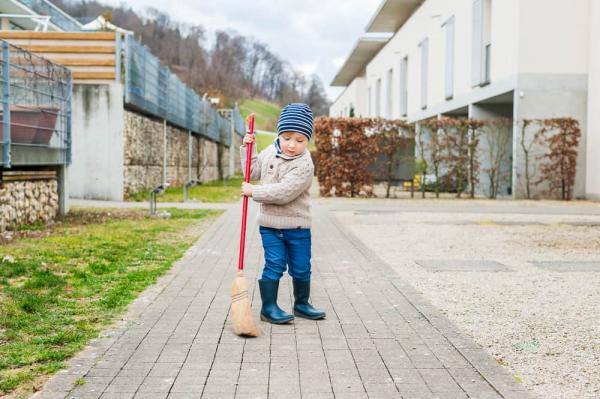
Maybe I'm getting old, but I don't remember spending much time doing homework after school, particularly as a young child. My afternoons were spent watching television while having snacks. Next, I would do my chores, and then I'd be free to play with friends in the neighborhood. I had piano and dance lessons but also plenty of free time.
Now that I have four kids at different school stages, I'm noticing how much time homework takes from our family routine. Homework isn't all bad, and I'm not completely against homework, but I do feel defensive of my children's time at home. I know I'm not the only mother who feels this way.
A friend of mine recently lamented that her children have no time to complete their household chores because of all their homework assignments, while another friend pondered how to deal with a teacher who posted a lengthy homework assignment at 5 p.m. - due the next day. I don't have easy answers to these problems, but here are some of the "home work" duties your children should have time to do at home.
Regular responsibilities
Children need to contribute in the home in positive ways. Having regular responsibilities helps children feel confident and valued. We have a rotating chart that assigns children to help cook, set the table and do the dishes. As a result, my 4-year-old is very capable in the kitchen (with direct supervision, of course). If done regularly, chores don't take long. Having children complete at least one job a day will help them realize what it takes to keep a house clean and a household working efficiently. Most small jobs take 15 minutes or less, and larger jobs can be saved for Saturdays or when school is out.
Developing relationships
I'm fairly certain my children are often nicer to their friends than they are to each other. The home is the best place to form and maintain relationships. Model good relationship behavior by being slow to criticize and quick to forgive. Your children will learn about marriage relationships and how to treat others by watching you and your spouse. Teach respect and show love, and expect your children to treat each other well even though they will often make mistakes. They can also practice relationship skills with extended family members and guests who come to your home.
Communication
Children learn to communicate mostly from their parents, who make eye contact and talk to them from the time they are born. Teaching children to communicate effectively and appropriately will take years - and lots of patience. I try to model good communication when my children speak unkindly without specifically calling them out. For example, if a child says "That toy is mine! Give me it now," I might say, "Please try it this way: That is my toy and I would like to play with it, please."
Parents need to be willing to let children talk about their lives - even the mundane things. Fred Rogers, child advocate and television star, said something quite profound about talking to children and making them feel comfortable talking to you. He said, "It's a real gift to children to talk about times when you felt sad or jealous or angry or proud. You're letting them know feelings are part of being human and that it helps to talk about them."
Play
An old saying I used to hear when I was younger is: "all work and no play makes Jack a dull boy." Some may argue that kids these days play too much, but I've noticed that many children don't have enough free time to play, mine included. We had an unseasonably warm fall where I live, and I wanted my 7-year-old to play outside as much as possible before the rainy season. Some days, her piano practice was rushed and her homework was a little late, but she got to play. I firmly believe play is the work of childhood, particularly for young children.
Families enjoy playing together in different ways. Some enjoy organized sports or attending sporting events. Others like playing board games or video games together. Many families enjoy just hanging out in the same room, goofing off and having tickling or wrestling matches. My family likes dance parties, game nights and dart gun wars. Help your children to find time to play, and make sure play is part of your family life.
Learn life skills
Before parents send their kids out into the world, there are a lot of things kids need to know. Budgeting, cooking, cleaning, basic sewing, car maintenance and how to work hard are all life skills that are taught at home. My oldest daughter has just four years left before college, and I'm realizing she has a lot left to learn. Start early by involving your children in the care and maintenance of your home. If they are so busy with outside activities that they don't have time to help at home, they will miss valuable lessons about important things they will have to do as adults.
Most kids want to feel grown up, so learning these skills will be fun for them. I know of some great mini chefs who cook fabulous meals for their families and hard-working kids who have started their own businesses. Even if your kids don't get too enthused over yard work and budgets, in time, they'll appreciate all the things you taught them.
Having enough time to teach life skills in the home, offering opportunities for enriching activities and completing homework assignments is a challenge. As you look at your family's schedule, don't underestimate the value of time at home. "Home work" is just as important as homework, and your role as parent will determine much of your child's future success.

